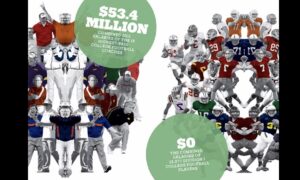By: Brandon Lee
For years there has been so much controversy with paying non-professional players that it seems this generation is more inclined to find new paths to the pros. So many sanctions due to third party financial scandal have been filed from the NCAA, that there’s a laundry list of violations that have been compiled against most major colleges. As well as there being more outlets for players to get paid such as the G league, Overseas or even the JBA. We can go back to the Fab Five of the University of Michigan Men’s Basketball team or in football, we had the USC Trojan Football team as examples why players are experimenting with their path in route to professional sports. Or even as recently as the Louisville recruiting scandal that got head Men’s Basketball coach Rick Pitino removed from the University. There has been so much that has gone on it has become a notion that the NCAA is a scam altogether. From players losing awards that they busted their ass for or injuries that the players had sustained when they should’ve been in the higher ranks in their respective sports. Amateurism is slowly dying as the demand for collegiate athletes to be compensated for the money that the colleges make off their efforts.
Let’s begin with the Fab Five of Michigan. First, to whoever wants to enjoy a good roller coaster of a documentary about brotherhood, look up the Fab Five on the ESPN 30 for 30 series. Excellent two hours of information. But back to this, in the spring of 1991, five freshmen were recruited by Steve Fisher and the Michigan Wolverines. Chris Webber, Jalen Rose, Juwan Howard, Ray Jackson and Jimmy King. These young men were the biggest commodity around the nation. This core group led the University of Michigan to the NCAA Final Four in both the ’92 and ’93 season. Although they came up short in both games, the culture shock changed the landscape of not only the sport but the conversation around amateur athletes. what happened after their sophomore year was great gas for that conversation. Chris Webber was drafted by the Orlando Magic in 1993 and was traded to Golden State on draft night. Soon after all that excitement Chris Webber was caught up in a scandal that dated as far back as the early 1980’s. By 1999, Webber was called upon a Federal Grand Jury along with former Wolverine athletes, Maurice Taylor, Robert Traylor, and Louis Bullock. All four were discovered to have borrowed a total of $616,000 from former basketball team booster Edward “Uncle Ed” Martin. Now because of these allegations, all wins and banners that were awarded to the University during the Fab Five’s tenure, were removed from the record books. Now based on word of mouth, Chris Webber had the talent to go play professional basketball straight out of High School. I wonder how his career and public perception would have turned out if he had the option of the G league.

Now some people may argue that college develops the talent but there are plenty of guys in basketball that have panned out very well taking unconventional routes. You’ve got elite talent like Kobe Bryant’s LeBron James, who went to the NBA from high school. You even have Kevin Garnett, Tracy McGrady, Rashard Lewis, Dwight Howard, Josh Smith, and Sebastian Telfair, who also went from high school to the pros. Brandon Jennings, Emmanuel Mudiay took back their commitment to their respective collegiate offers to play overseas. Also in this past draft the Knicks took Mitchell Robinson in the second round, who decomitted from Western Kentucky to work out for an entire year for the NBA. It’s a huge flight risk to make the jump but for some people it’s more than talent. Families who never had anything automatically create this “Rags to Riches” narrative. Others leave college as soon as their draft stock reaches a certain point. Lance Stephenson left college after 2 seasons, played for the Bearcats of Cincinnati, was told to stay because the team was built to win a championship with him at the core. Lance is from the tougher area in Brooklyn, New York. He made the decision to forego his collegiate career and head to the pros because he had to provide for his family. He bet on himself and has had a career of moderate success.
USC Trojan Football was elite, the early 2000s the Coliseum was the place to be. Crazy to think that considering the Los Angeles Lakers 3 peat that season. And yet, the talk of the town was a college south of Los Angeles. You had Will Ferrell, Snoop Dogg, George Lucas, Forest Whitaker and at the time these names were big time, just as big as seeing Jack and Denzel at the Forum where the Lakers play. But the difference? THIS IS COLLEGE. Football was run by Reggie Bush, Matt Leinart, Troy Polamalu, Dwayne Jarrett, LenDale White, Steve Smith, Ryan Kalil, and Lofa Tatupu, just to name a few top tier players. One player, in particular, Reggie Bush, took gifts from boosters before he went pro. Reggie Bush arguably had the greatest collegiate career of any Running Back in football, EVER. Won the Heisman went on to have a good career in the NFL, playing for 5 different teams, but the greatness of Reggie Bush the USC megastar was taken away due to those gifts given to him.
Terrell Pryor was someone who was said to be NFL bound coming out of High School. Jeannette, PA born and raised, he went to Ohio State University. This man was a STUD out there. He too got in trouble with the NCAA, but not for receiving gifts, but for signing autographs and memorabilia. Now the issue for most people, and I feel the same way, why can’t the student-athletes make money while they are in school. What is the issue with players signing autographs on jerseys that have THEIR NAMES on them!? What is the problem with students creating businesses? Harvard is where Facebook was created right? But Isaiah Washington of The University of Minnesota gets in hot water for marketing Jelly “Fam”, for what he was doing growing up in Harlem, and yet Nike took some of that and used it for their marketing procedures. Yes, prospective student-athletes are going to big-time colleges and are getting a great opportunity for education. Yes, the chance to go to prestigious programs are not easy to come by. But is it smart in today’s day and age to forfeit the opportunity to profit off yourself when you are the reason the big dollars are coming in?
Coming from a former collegiate athlete I think paying a small amount during the season should seem fair, 50 bucks a game? 100? 30+ games a year at the minimum? 12-15 players a roster? So a team will pay an entire roster $36,000 a year, $3,000 a player, but will make 100 million per season? A good proposition could be to add that to a fund that the player can’t touch until he graduates from the school. This also would be a small incentive for the athlete to finish school as well. Now I get it, rookie contracts scales from 1 million to 7 million per season, but 4 years and $12,000 in your pocket? When the NCAA isn’t willing to pitch this to colleges to some people not all, the NCAA seems like the new age slave trade auction block. Making all this money on players who won’t ever get to see that money. There’s a way to resolve this matter, it just seems that the advent of profitable developmental leagues in all sports is making the NCAA obsolete.





